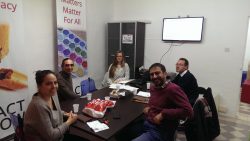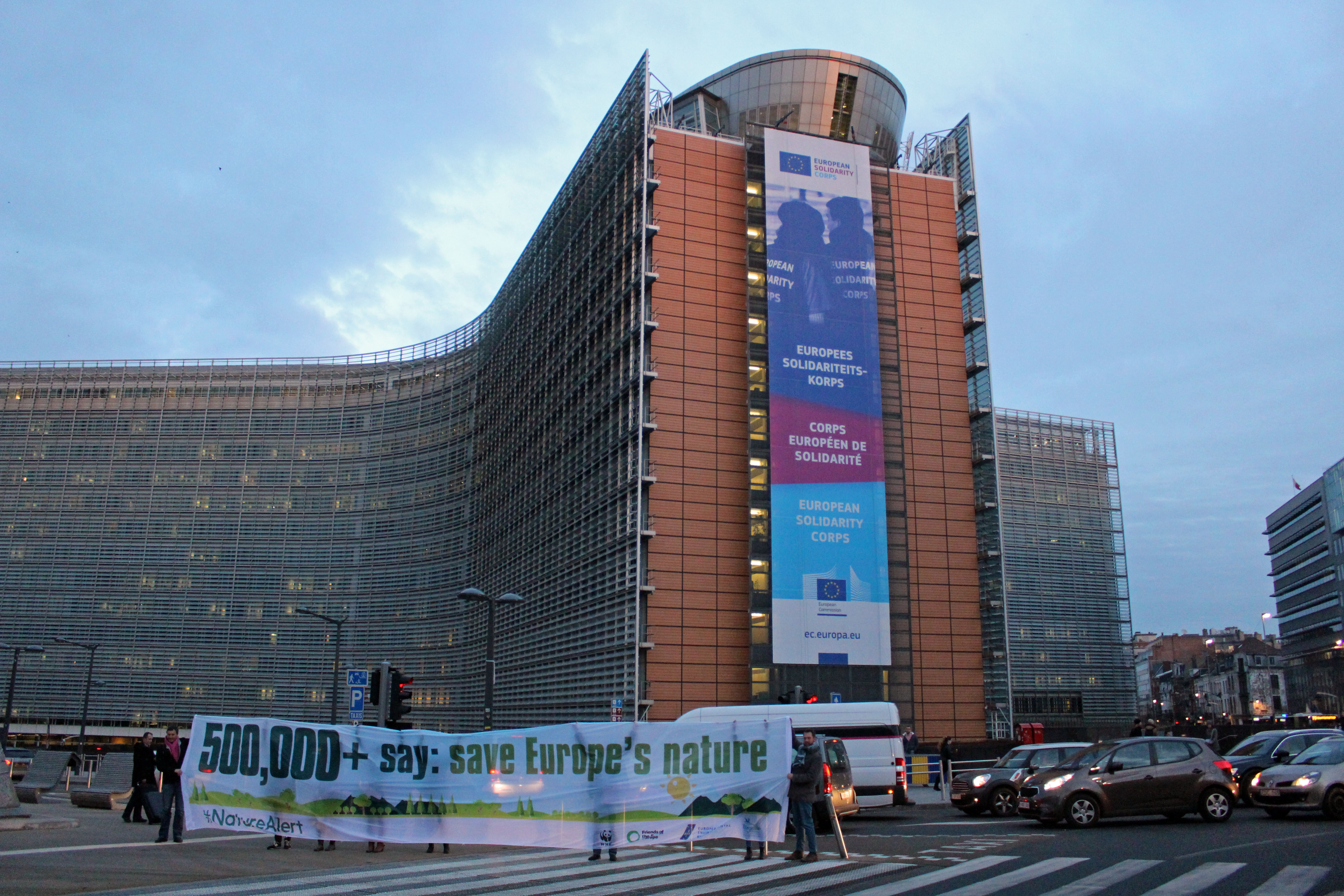Between the 1st of January and the 30th of June 2017, Malta is at the helm of the Presidency of the European Union (EU). At BirdLife Malta we are using the opportunity to increase our common engagement and advocacy work on topics of importance for the environment on a national and EU level.
As stated when Malta hosted the informal meeting of the European Council held in Valletta at the start of the Maltese Presidency, during this six-month period we want to highlight the opportunity our country has to lead discussions to shape the future of Europe in the direction of sustainable development with a clear focus on environmental and social integration on all levels. Environment should be at the heart of the EU political discussions.

One of the meetings of the Maltese EU Presidency held in January 2017 at the Voluntary Council Centre in Valletta (Photo by BirdLife Malta)
The European Union is at a changing point and it is up to the European leaders to reestablish trust from the society by committing to our common vision of sustainable development. A future that we want to see for the generations to come is a future in which people, social justice, environmental and health protection, democracy, and transparency are at the heart. Such a vision is provided in the United Nations 2030 Agenda for Sustainable Development; environmental and economic policies need to be in coordination with each other and dialogue has to be open for the citizens of the European Union to participate.
Let’s use this opportunity to make sure that our common vision for the European project also has a strong focus on the environment!
Background
For the EU Presidency being hosted by Malta between 1st January and 30th June 2017, we are using the opportunity to increase our common engagement and advocacy work on topics of importance for the environment on a national and EU level.
As a network of national environmental NGOs and VOs with common goals and objectives in the environmental field, we collaborate in our efforts to engage in, increase our impact and influence policy-making and decision-taking in Malta and Europe during this important period.
In Malta, we are confronted with various environmental challenges on a national level. All environmental NGOs and VOs work with a specific focus and sound expertise on particular environmental issues. Through information exchange, increased communication and knowledge management among national environmental NGOs and VOs during the Maltese EU Presidency and thereafter, we address challenges commonly, to strengthen our collaboration and relationships in the environmental sector and to create synergies and complete each other.
Environmental priorities
In 2014, the European Council agreed on five overarching priorities which will guide the work of the European Union over the next five years:
Stronger economies with more jobs
Societies enabled to empower and protect
A secure energy and climate future
A trusted area of fundamental freedoms
Effective joint action in the world
In a press release from 19th December 2016, Malta officially published the environmental priorities for the months between January and June 2017. These include:
1. Climate Change with a focus on the implementation of the Paris Agreement and the UNFCCC negotiations after COP22 in Marrakech
2. Progress on Emission Trading Scheme (EU-ETS) revision, Effort Sharing Regulation and negotiations of the Land Use, Land Use Change and Forestry Regulations (LULUCF)
3. Follow-up discussions on emission from aviation after the International Civil Aviation Organisation General Assembly
4. Lead negotiations on advancing a circular economy in the EU with discussions on amendments to the Waste Directives, including Restrictions of Hazardous Substances Directive
5. Other topics of importance will include: Persistent Organic Pollutants Regulation, Birds and Habitats Directives post Fitness Check, Environmental Implementation Review, and possibilities to adopt a Water Strategy for the Mediterranean during the informal council meeting on 25th April (ocean governance, marine litter, plastic strategy)
Engagement
EU Presidencies provide an opportunity for Presidency host countries to gain an improved European perspective and at the same time to contribute to the EU discussions and decisions with their national expertise. It is an excellent opportunity to advocate in close cooperation with international platforms – such as the European Environmental Bureau (EEB) and network partners in other European countries – for environmental priorities on EU and national level as well as to strengthen national platforms and build new partnerships.
Activities are aiming towards:
Engaging on both advocacy and project level
Fostering relationships with decision makers, partners and other actors
Highlighting own work and combine work with other actors to achieve mutual goals
Promoting environmental awareness among civil society
As environmental organisations including Nature Trust Malta, Friends of the Earth Malta, Flimkien Għal Ambjent Aħjar and the national partnership platform for environmental organisations Terra Firma, we meet on a regular basis during the Maltese EU Presidency to discuss upcoming events, plan engagement activities, coordinate joint advocacy meetings with governmental authorities and communication efforts. All environmental organisations in Malta are invited to participate in these meetings.
It is important to consider that the EU decision making process depends on the will of Member States and EU institutions. This is closely tight to the general agenda that the three trio countries have agreed on.
However, we are particularly focusing on the following topics:
– Nature Directives post Fitness Check: the Commission published the results of the Nature Directives Fitness Check and a road map – called “An Action Plan for nature, people and the economy” on 10th February 2017 – which will hopefully lead to a concrete Action Plan being adopted during the Environmental Council meeting in June 2017. The road map identifies current challenges of the implementation process of the Nature Directives in EU Member States, including insufficient funding, lack of law enforcement and terrestrial and marine Natura 2000 site management.
– Fisheries: Decisions on thefinal position of the Technical Measures Regulations started being discussed in March 2017 in the European Council and debates on the Multiannual plan for the North Sea will be led by Maltese Presidency. Fisheries is a delicate topic in Malta, many stakeholders are involved in the sector with different interests and needs and a sufficient communication is strongly needed to resolve stakeholder conflict as well as develop and implement sustainable and environmental-friendly measures. Necessary steps include to develop and implement Marine Protected Area management plans, to eliminate destructive fishery techniques, to minimize by-catch e.g. through tactical selectivity measures as well as negative impact on ecosystems caused by fisheries including seabirds, ensuring sustainability of aquaculture. Sufficient legal frameworks have to be developed and appropriately implemented to regulate the fishery sector in Malta. Proper enforcement is highly necessary regarding Malta’s efforts of “Making Malta a Centre of Maritime Excellence” as a political vision under the Blue Growth Initiative and Malta being the hosting country of the high-level maritime conference “Our Ocean” on 5 and 6 October 2017.
– Simplification of the Common Agricultural Policy (CAP): Together with BirdLife Europe, BirdLife Malta as a partner of the Agricultural Campaign Living Land, we are aiming towards research and innovation for the sustainable management of natural resources in Europe. This includes initiatives on bird-friendly farming and research on organic farming activities in Malta.
– For the midterm review of the Multiannual Financial Perspective, we work towards ensuring better and increased financing for biodiversity and Natura 2000. This will be particularly important after 2020 and crucial for guaranteeing and improving the implementation of the Nature Directives by the EU Member States.
– New policy for Climate and Energy, including sustainability criteria for Biomass: On 20th July 2016, the European Commission published its proposals for Land use, Land Use Change and Forestry (LULUCF) regulation and Effort Sharing Regulation (ESR). The main objective of the LULUCF is the integration of land use and forestry into the EU 2030 Climate and Energy Framework and to regulate emissions from transport, waste, agriculture, buildings, land use and forests after 2020. As a European network, BirdLife aims towards ensuring that growth of renewable energy in the EU is in harmony with nature. This requires new safeguards for bioenergy and better planning for the deployment of renewable energy installations, including climate friendly transformation, clean air, healthy forest, and biodiverse landscapes.

Nature Alert action in Brussels in December 2016 (Photo by Friends of the Earth Europe)
Useful links
Official Malta EU Presidency website.
General Information on EU Presidencies.
Official Press Release Environmental Priorities.
Times of Malta Article on Environmental Priorities (January 2017).
European Environmental Bureau (EEB) Memorandum to the Maltese EU Presidency.
EEB Priorities for the European Union for the first Semester of 2017.
Nature Directives Fitness Check.
Road Map “An Action Plan for nature, people and the economy”.
Further information
Here you can download information related to our activities and engagement during the Maltese EU Presidency.
EU Presidency, presentation during the first meeting of environmental organisations.
EU Presidency, presentation during the second meeting of environmental organisations.
Contact Person
For further information, please contact our Policy Officer Janina Laurent on [email protected]

